About Dental Implants
Lifelike and Long-Lasting Replacement Teeth
Dental implants are a life-changing solution for missing teeth. They look, feel and function like your natural teeth and have a proven track record of success.
At Greater Pittsburgh Dental Implants & Periodontics, Dr. Bakuri is a specialist in implant placement and provides exceptional service.
What Are Dental Implants?
A dental implant is a biocompatible titanium post that is inserted into the jawbone to replace a missing tooth root. Once the implant, or multiple implants, have integrated with the bone, they can support a crown or bridge, or even secure a complete denture arch.
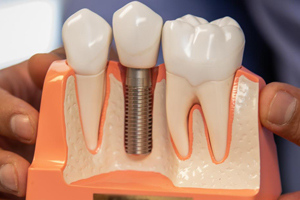
Stable, predictable implants eliminate the need for partial plates, traditional bridges and dentures, all of which can be cumbersome and difficult to clean. Additionally, artificial teeth that are not stabilized with implants frequently slip, causing irritation to the gums.
Dental implants look, feel and function just like natural teeth and can last a lifetime if cared for properly. Modern dental implants have a proven track record of success and provide a life-changing option for many patients!
Who Are Candidates for Dental Implants?
Years ago, patients with health conditions such as diabetes, or unhealthy habits such as smoking, were not considered to be candidates for implants due to the potential risks involved. This is no longer the case. Techniques to rebuild lost bone have evolved rapidly, as have the minimally invasive methods of inserting implants. These advancements, in conjunction with health coaching, allow Dr. Bakuri to help most patients who are interested in receiving dental implants.
In fact, we have helped many patients get implants who were turned away by other doctors.
Experienced and Skilled Implant Specialists
As board-certified periodontists, Dr. Bakuri has specialized, advanced training in the field of dental implant placement. In addition, Dr. Bakuri also uses his experience and skill to teach other dental professionals about the procedure.
Ensuring Long-Term Success
Dental implants that have been properly placed and maintained can last a lifetime. Conversely, implants that have been placed at incorrect depths, the wrong angle or are too close to other teeth can cause a multitude of problems.
Dr. Bakuri has the training, experience and skill to place your implants precisely to ensure the long-term success of your dental implants.
Special Offer – Free Second Opinion for Dental Implant Treatment
Bring your X-rays and treatment plan and get a free second opinion with Dr. Bakuri.
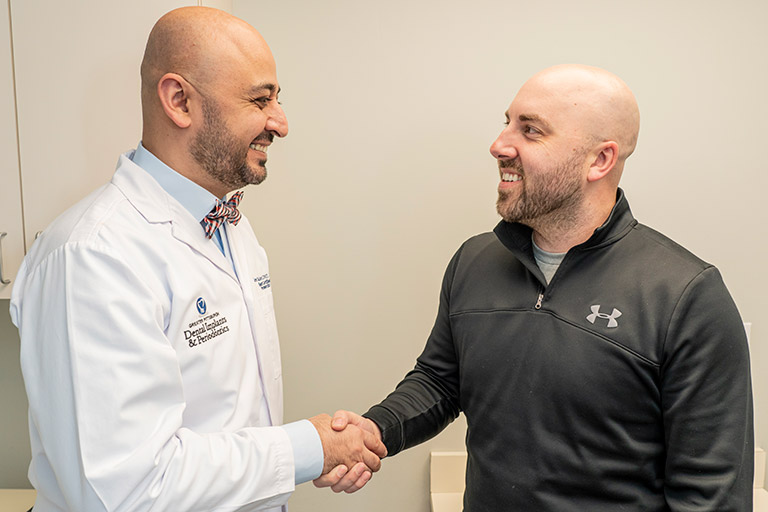
Call 412-487-8288 or click here to schedule your appointment.
State-of-the-Art Diagnostics
We have equipped our practice with a 3D cone beam scanner that captures 360-degree views of your entire mouth, showing us the exact relationships between, and condition of, your bone, teeth and sinuses.
Using this imagery, we can precisely plan the placement of your implants into areas of your jawbone that have the highest levels of bone density and at the correct angle and depth to ensure a successful outcome.
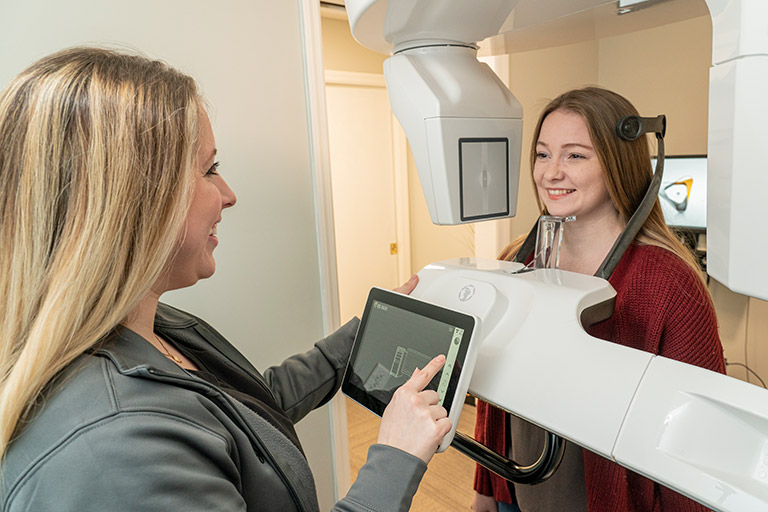
Our 3D Cone Beam CT scanner reveals the amount and density of bone in your jaw, which is vital for precise planning of implant placement surgery.
$199 Dental Implant Exam, X-Rays and Consultation
- Comprehensive oral examination
- Full mouth X-rays
- Oral cancer screening
- Consultation with the doctor
- Written treatment plan
Call 412-487-8288 or click here to schedule your appointment.
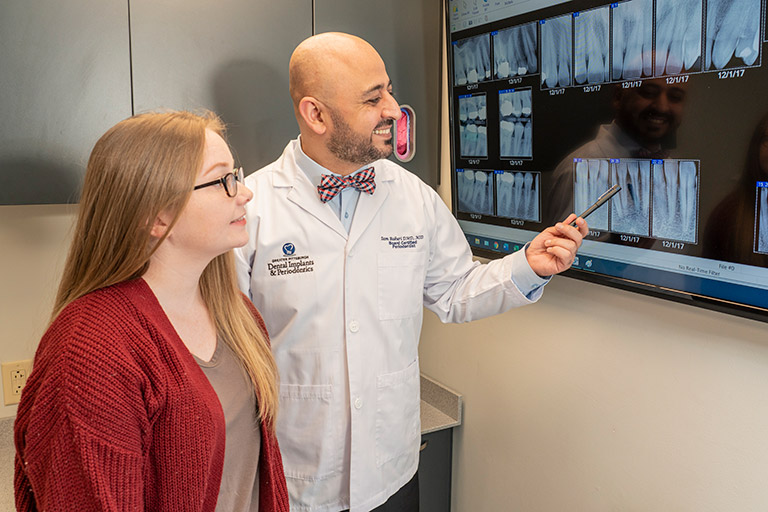
Benefits of Dental Implants
Dental Implants Can Last a Lifetime
Implant posts are composed of non-corrosive, neutral, long-lasting titanium. However, dental implants are susceptible to periodontal disease like natural teeth, which is why we provide special cleanings to keep your gums and implants healthy.
Dental Implants Function Like Natural Teeth
Implants provide full chewing power, allowing you to eat the foods you like and need to maintain healthy, balanced nutrition. You can brush and floss as you normally would, and our friendly, knowledgeable hygienists will show you personalized techniques for caring for your implant during your routine oral maintenance at home.
Implants that are used to support restorations such as dentures and dental bridges are also very lifelike in appearance and function. The more implants that are used to provide support, the more natural your restoration will feel and act.
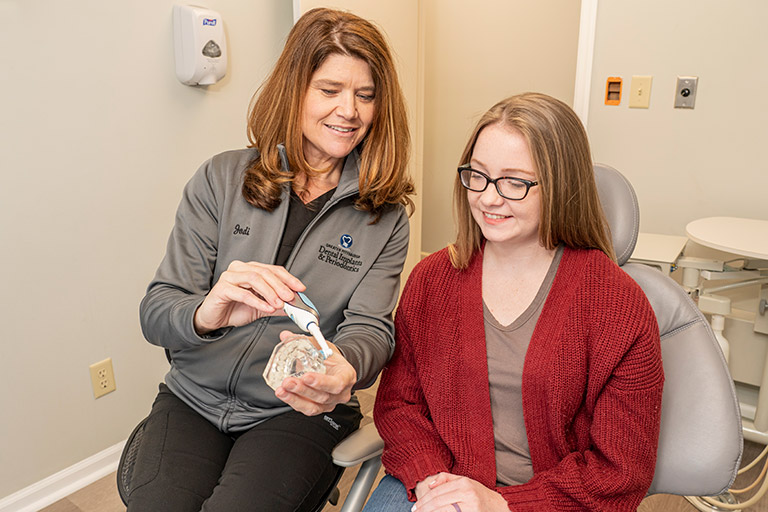
Implants can be cleaned just like natural teeth. Our hygienists will help instruct you how to properly care for them.
Dental Implants Keep Adjacent Teeth Stable
When a tooth is not replaced, the gap that occurs can destabilize adjacent teeth, causing them to shift toward the gap. This shift pulls your teeth out of proper alignment and can cause problems with your bite and ability to chew. A misaligned bite can also lead to jaw joint disorders.
Dental Implants Prevent Bone Loss
A benefit that simply can’t be overemphasized is that dental implants prevent bone loss in the jawbone. Bone requires the stimulation of full-force chewing to continue to thrive, and dental implants support this need in the same way as natural teeth.
Without an implant to replace a missing tooth, bone beneath the gap loses 25% of its volume in the first year alone, and bone loss continues over the years. Dentures can even accelerate bone loss by rubbing away at the boney ridge that supports them and wear it down.
Dental Implants Can Prevent Facial Collapse
Dental implants prevent bone loss, which means they also help prevent the facial collapse that people with many or all teeth missing experience. Due to progressive bone loss caused by missing teeth, the height between the tip of the nose and chin decreases, causing the lower third of the face to collapse.
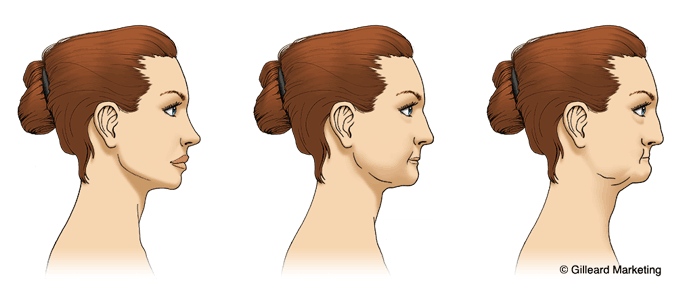
Missing teeth and wearing dentures cause a gradual progression of bone loss until the face appears to collapse in on itself.
Other changes include more wrinkles around the mouth, drooping jowls, sagging skin and thinner lips, which may cause a person to look much older than their true age.
Dental Implants Vs. Dentures
Implants provide full chewing power, allowing you to eat the foods you like and need to maintain healthy, balanced nutrition. You can brush and floss as you normally would, and our friendly, knowledgeable hygienists will show you personalized techniques for caring for your implant during your routine oral maintenance at home.
Implants that are used to support restorations such as dentures and dental bridges are also very lifelike in appearance and function. The more implants that are used to provide support, the more natural your restoration will feel and act.

Your ability to chew can be restored with dental implants, allowing you to eat the foods you enjoy and need for proper nutrition.
Stable Teeth With Good Chewing Power!
Dental implants provide you with many benefits that dentures simply cannot because dentures are fundamentally unstable. Since dentures increase bone loss, rather than prevent it, dentures that may have fit beautifully when first created will lose their fit as result of lost bone.
Losing the ability to chew properly is not only frustrating for denture wearers, it can also lead to poor nutrition as it is difficult to bite into or chew many healthy foods.
Below are some of the other drawbacks of dentures. The placement of dental implants to support your dentures will alleviate these issues:
- Dentures often have to be kept in the mouth by using a dental adhesive.
- Dentures have to be removed for cleaning. Your implant-supported restoration can be cleaned by brushing and flossing. (The exception is a removable implant-retained denture.)
- Dentures cover the roof of the mouth. With implants, there’s nothing covering the roof of your mouth to interfere with your sense of taste or your speech. Implant-supported dentures can also be fabricated without a palate.
- Dentures don’t provide the stimulation needed to prevent bone loss. Jawbone requires the stimulation of chewing to maintain its volume and continue to thrive. Dental implants prevent bone loss.
- Dentures can slip out while eating or speaking. Implants and implant-supported dentures are securely anchored and won’t slip out. You can eat and speak with confidence.
- It’s hard to chew with dentures, and you can’t eat a lot of the foods you like or need. Dentures can move while you chew, which is not only annoying, but also makes it difficult to actually eat your food properly. In fact, dentures generally provide only 10% or less of full natural chewing power. Dental implants restore natural chewing power, and implant-supported bridges or dentures also considerably increase your ability to chew properly.
- Dentures can make a click sound while eating or speaking. With implants or implant-supported dentures, there’s no embarrassing clicking.
- Progressive bone loss as a result of wearing dentures can cause facial collapse. Over the years, bone loss can cause the collapse of the lower third of your face, creating excessive wrinkles, sagging skin and jowls, thinning lips and a sunken-in look. This can considerably age a person’s appearance.
Dental Implants Vs. Dental Bridges
Implants Provide a Minimally Invasive, More Affordable Solution
A traditional dental bridge consists of an artificial tooth that is supported by crowns attached to the adjacent teeth. The problem is: healthy adjacent teeth need to be shaved down to accommodate the bulk of the crowns. Dental implants do not require healthy teeth to be altered or damaged.
Bridges tend to have short lives—about five to ten years. Comparatively, a dental implant can last a lifetime. So, while a bridge can sometimes be more economical initially, in the long run, a dental implant can cost you less.
Call 412-487-8288 or click here to schedule your appointment.


